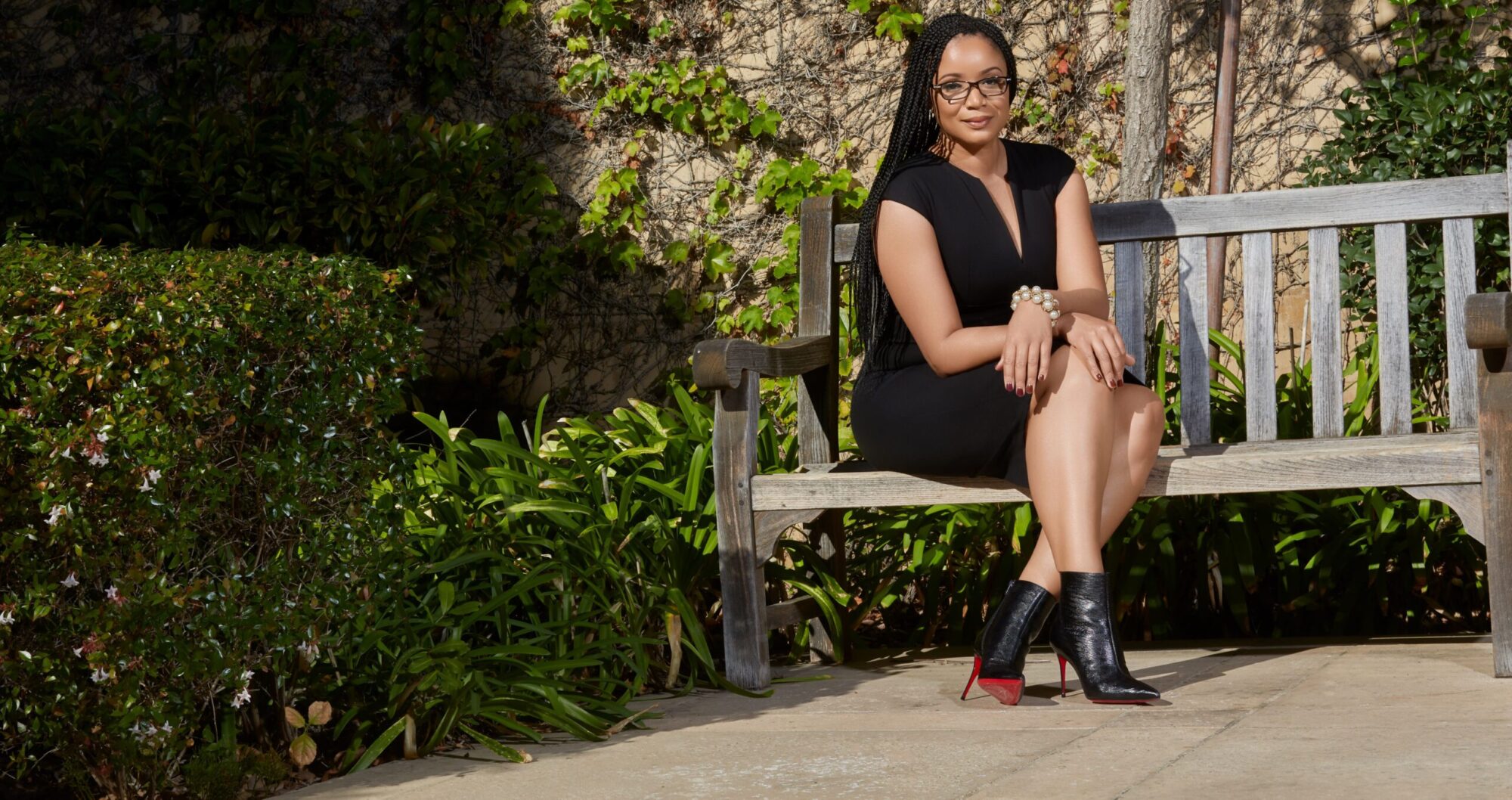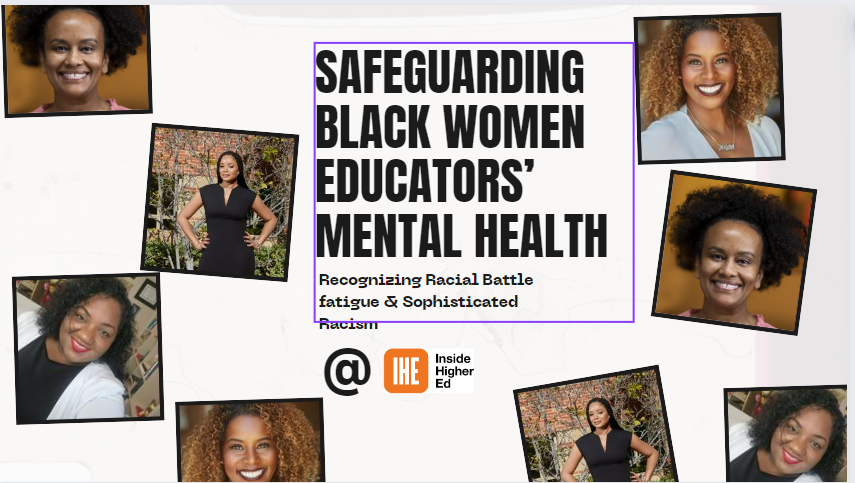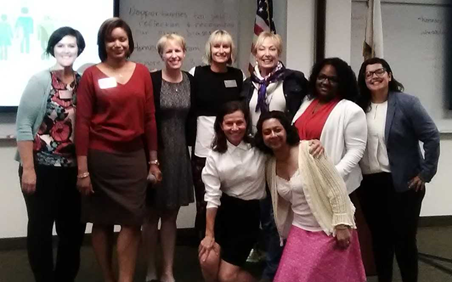February 2024 issue of Higher Education Digest® Magazine
Featured inside #WeAreTheCitation by Dr. Jálin B. Johnson

We Are the Citation – Honoring Lived Experience within Academia
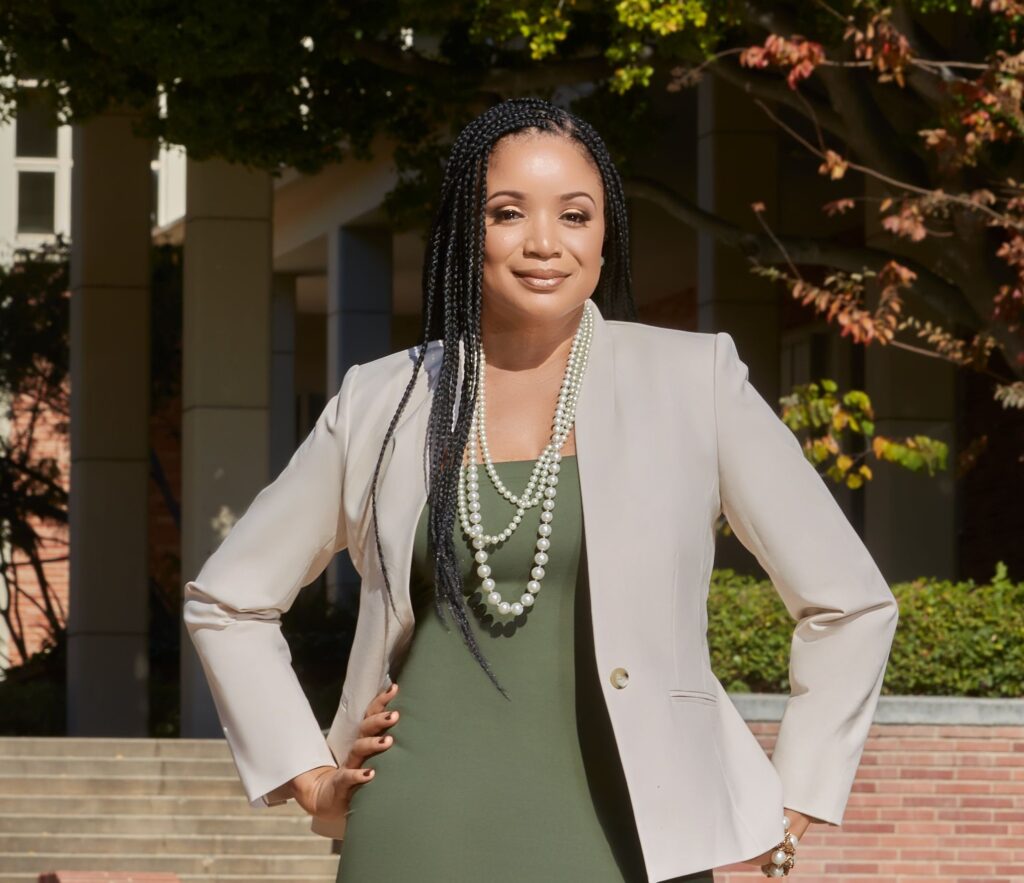
In the early fall of 2023, I shared the hashtag #WeAreTheCitation as part of a social media calling associated with amplifying the voices of Black Women and members of the global majority within higher education and in spaces of scholarship.
Much like the embraced call to “Cite Black Women,” noting that “We are the citation” incites recognition. Doing so requires acknowledgment that the lived experiences of members of minoritized groups are significant and add valued perspectives to scholarly discussion. Additionally, this call denotes that these experiences should be equally valued among commonly cited authors and scholars within institutions of higher education (IHEs). One path towards honoring these lived experiences is accomplished by highlighting them alongside those from groups considered predominant within Western-influenced, IHE scholarship.
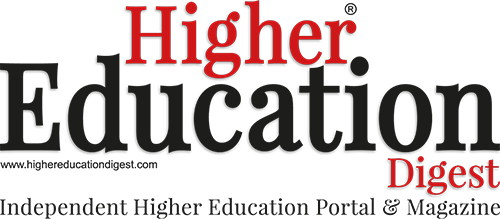
Invisible Labor and Emotional Currency
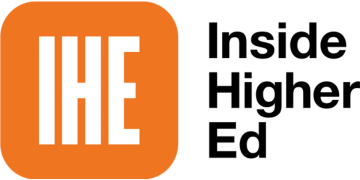
Jálin B. Johnson, Nakisha Castillo, Natalie V. Nagthall and Hawani Negussie describe the unseen impacts of higher ed’s cultural taxation on minoritized faculty and eight steps to help diminish those impacts. (October, 2023)
FUEL 2023
Inclusion & Diversity Panel: Inspirational Leaders discuss how Inclusion is key to the success of a digital future
• North America • Brazil • Europe • Australia • Japan • Southeast Asia •
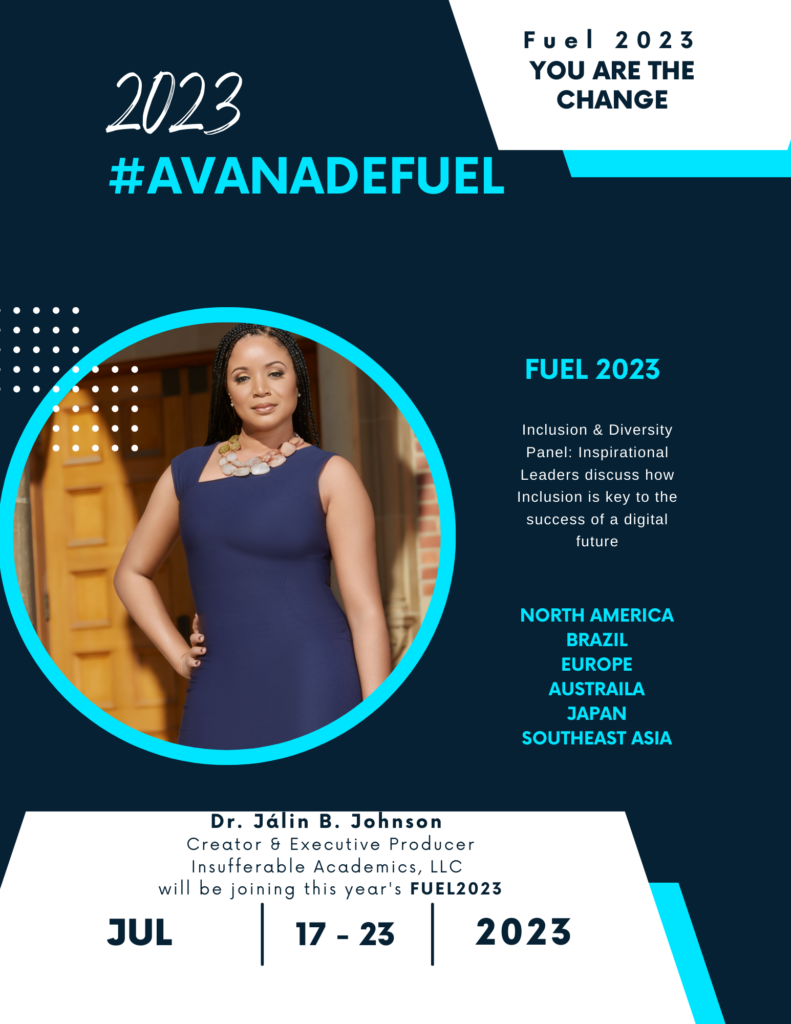
Five Ways to Support Your Diversity Officer – Attainable Action Steps for Leaders and Managers
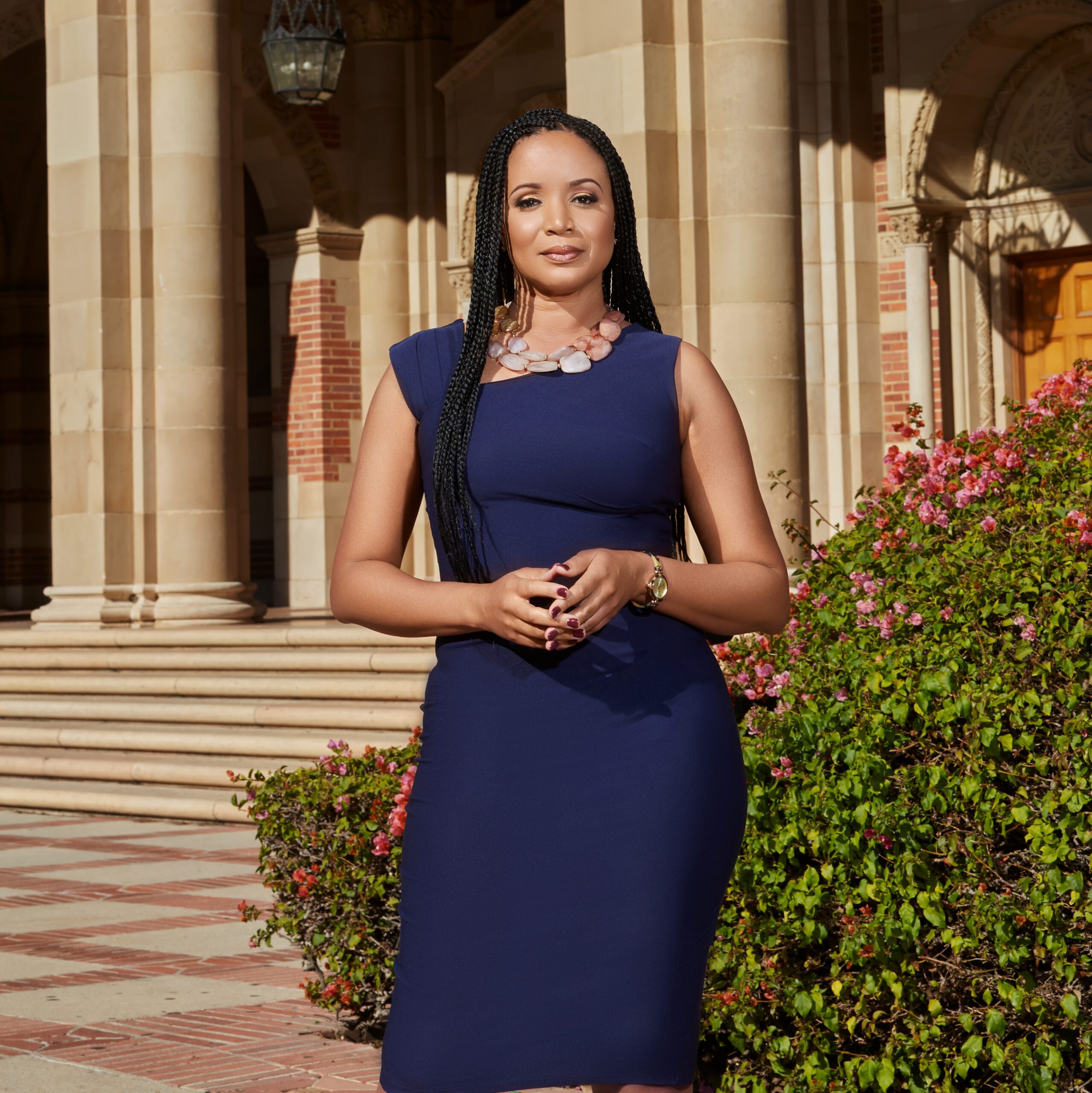
UMass Global community encouraged to view Black History Month as an invitation for year-long learning
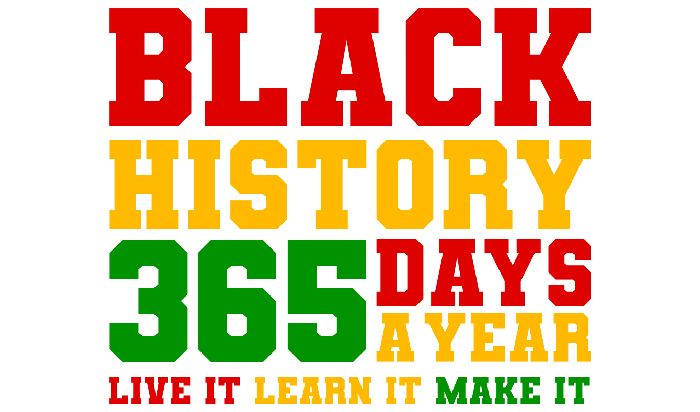
“In this year alone, we have navigated the suffering surrounding mass shootings in our communities, publicized confrontations for human rights, social injustice, inhumane loss of life, and global tragedies, said Dr. Jálin B. Johnson, vice chancellor of equity and inclusion and senior diversity officer.
“It is important that as we advocate for equity, we also allow space for acknowledging trauma, the lived experiences of others, and the need for healing,” Johnson continued. “Equally as important, as I have reminded myself and others throughout the years, we must give ourselves grace.”
CEEDAR Podcast
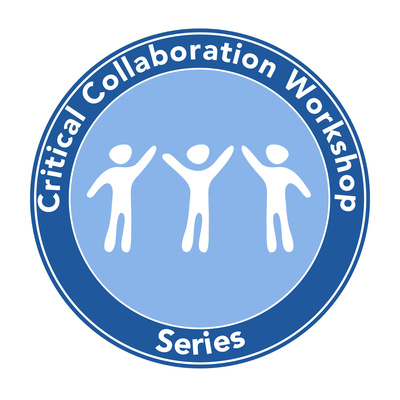
Thank you to the collaborators at #California #CEEDAR for inviting me to participate in their Critical Collaborations Series to discuss inclusive practices within the academy, guiding J.E.D.I. principles and innovative practices to advance advocacy work in IHEs. It was a pleasure to join our episode host Dr. Nicole Schneider and fellow esteemed panelists Dr. Nat Hansuvadha and Dr. Eric Engdahl. Thank you for all of the advocacy work you do in our communities. Supporting our students and modeling what it means to uplift our colleagues whose invisible labor, taxation, mentoring and community service, which can often go unnoticed, is valued and imperative.
Advocating for Equity
“Throughout the year, we have the privilege of connecting, collaborating and supporting our team members from across the university,” said Jalin B. Johnson, vice chancellor of equity and inclusion. “The many conversations we have, and the efforts we partner on, serve as community centered reminders for the OEI team. Taking the time – year-round – to honor, remember, build, create supportive spaces, and listen is imperative to advocating for equity. This is a key part of how we interact with others, build our own personal awareness, and continue the process of both learning and unlearning, in addition to making space for wellness and healing.”
UMass Global collecting faculty, staff and student stories via Advocating for Equity project
December 13, 2022 Print Article
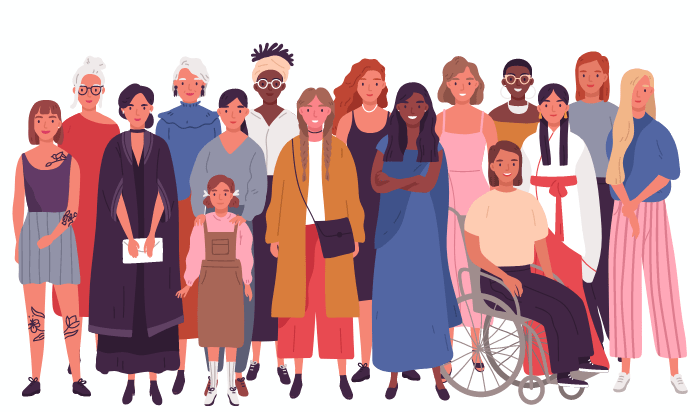
Members of University of Massachusetts Global’s faculty and staff spend countless hours helping students get closer to graduation, often finding this work satisfying and rewarding. Yet many among our ranks are also taking bold actions outside of work to make their neighborhoods and broader communities better places. With an eye toward sharing model stories on how colleagues can create a gentle balance between being a change agent while at work and at home, the Office of Equity and Inclusion (OEI) has launched the Advocating for Equity project.
“Throughout the year, we have the privilege of connecting, collaborating and supporting our team members from across the university,” said Jalin B. Johnson, vice chancellor of equity and inclusion. “The many conversations we have, and the efforts we partner on, serve as community centered reminders for the OEI team. Taking the time – year-round – to honor, remember, build, create supportive spaces, and listen is imperative to advocating for equity. This is a key part of how we interact with others, build our own personal awareness, and continue the process of both learning and unlearning, in addition to making space for wellness and healing.”
OEI is strongly encouraging submissions from faculty, staff, and students who would like to share their experiences. Stories that could be shared under the Advocating for Equity banner include accounts of personal service with organizations promoting social justice, organizations helping people who live with disabilities, resource and cultural centers, or faith-based or non-denominational groups. OEI is also interested in accounts of community happenings in which “extending equitable advocacy, support and resources for others, is the focal point.”
You can find the OEI online portal here. For more information, please contact the Office via OEI@umassglobal.edu.
We look forward to learning more about how our faculty and staff are changing their communities for the better.
Recognizing the importance of diversity and inclusion in higher education
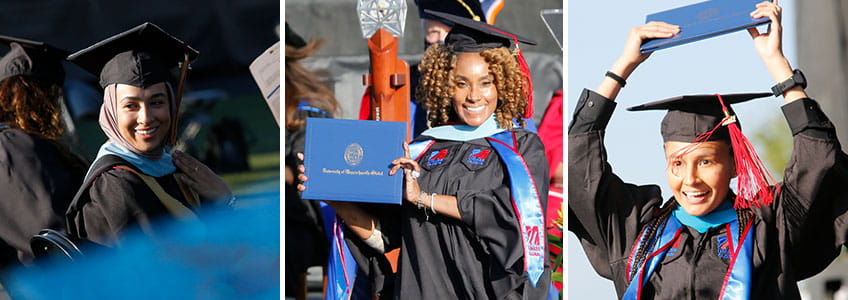
The desire to learn and grow one’s own understanding of the world and its wonders is an innately human urge. All people should have the chance to attend a supportive and welcoming school. Yet throughout its history, the American school system has failed to provide this opportunity to students from marginalized communities.
Recently, the importance of diversity and inclusion (D&I) in all spaces — including higher education — has been pushed to the forefront of the national consciousness. Institutions and organizations of all kinds have started new D&I initiatives and/or doubled down on existing efforts.
To better understand this critical work and why it is an essential part of a college education, we spoke with Hugo Yepez, director of strategic plan evaluation and assessment, and Dr. Jalin B. Johnson, vice chancellor of equity and inclusion, chief diversity officer and professor. Yepez and Dr. Johnson serve students through their work in the Office of Equity and Inclusion (OEI) at University of Massachusetts Global.
Inclusivity in Social Work
| September 13, 2022 Inclusivity in Social Work  |
| Recognizing an imperative to better prepare students for service in a multicultural and diverse nation, UMass Global social work faculty have spent two years engaging with the university’s Office of Equity and Inclusion to improve practices within their department. Professors and staff who have devoted their time to adding JEDI (Justice, Equity, Diversity, and Inclusion) concepts to the learning experience will soon discuss their work at the annual meeting of the Council on Social Work Education. The convention, themed “Leading Critical Conversations: Human Rights are Global Rights,” is scheduled for Nov. 10 through 13 in Anaheim and will provide a venue for social work faculty and OEI staff to share the steps they have taken to enhance inclusivity within the Department of Social Work. These actions include updating student materials and a series of faculty retreats focused on discussions of antiracism. “I’m always excited when we can see the efforts coming to fruition in settings outside the university … it’s good to see not only the work we’ve done in our university but also how it can impact other universities,” said Hugo Yepez, director of OEI strategic plan evaluation and assessment. Faculty members Jeannine Meza, assistant professor of social work; Amber J. Ramirez, associate professor of social work, and Justine Rangel, assistant professor of social work, plan to lead a panel discussion during the November gathering. Yepez is also scheduled to join the presenters and Dr. Jalin B. Johnson, vice chancellor of equity and inclusion, and OEI staffer Jenny Park, equity and inclusion specialist, are set to participate by helping to respond to audience questions. Meza, one of the faculty members involved in this effort, pointed to research showing U.S. social work students often graduate without obtaining sufficient knowledge of how to serve diverse clients. This realization inspired faculty members to enhance antiracist components of social work programs, discussing such resources, such as Ibram X. Kendi’s “How to be an Antiracist.” “Through these conversations, we developed a better understanding of one another as faculty and staff,” Meza said. “We created a pool of resources to utilize for curriculum revisions to be an antiracist and antioppressive social work program. This will be our area of focus for 2022-23.” The Council on Social Work Education’s anti-racism principles, as outlined in the body’s 2022 Educational and Accreditation Standards, are also informing the process of updating social work programs. The Department of Social Work’s own Diversity, Equity, and Inclusion Committee formed prior to the 2020 creation of OEI, Johnson said. Social work faculty have since worked closely with OEI to update their department’s programs and practices. This collaboration has resulted in updates to student handbooks and manuals involving such additions as gender-neutral language and anti-discrimination statements, as well as care to ensure that other materials referred to in the documents are accessible. OEI staffers are now engaged in similar work with additional academic departments and will be responsive to requests from others seeking to align their operations with best practices in diversity, equity, and inclusion. “We always go where we’re invited, which is a wonderful thing,” Johnson said. |
OEI J.E.D.I. Day (Inaugural)
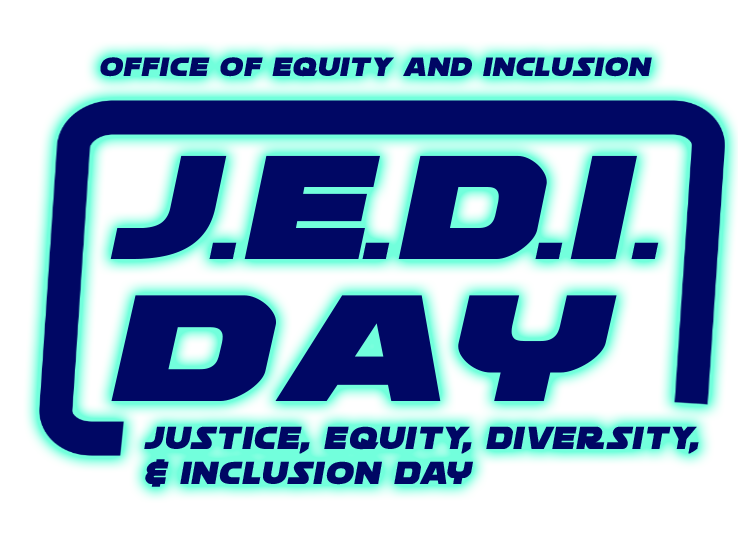
In December of 2020 – when first taking on the role of Vice Chancellor of Equity and Inclusion/Diversity Officer – the vision that was “OEI J.E.D.I Day” was but a seed.
A hope for our community to come together and engage with one another surrounding discussions focused on justice, #equity, diversity and inclusion, held the promise of transformational change.
This MayThe4th – that vision of hope became a reality.
It took collaboration, partnership, trust, altruism and advocacy.
It was but for the tireless efforts of Hugo Yepez, M.Ed. and the unwavering support from Jenny Min Jung Park that this vision of hope was realized.
It is due to the time, passion, commitment, diversity of thought, and trust given by so many students, alumni, staff, faculty and administrators in our community, that the world’s first ever OEI J.E.D.I. Day was realized.
I am humbled.
I am thankful.
I am hopeful.
Driving Institutional Change: Building Upon the Invisible Labor and Lived Experiences of Black, Minoritized, and Underrepresented Employees
Association of American Colleges and Universities conference
Presentation: Driving Institutional Change: Building Upon the Invisible Labor and Lived Experiences of Black, Minoritized, and Underrepresented Employees
We appreciated the opportunity to connect and engage with so very many members of the academy. Thank you to my fellow presenters and colleagues Dr. Nakisha Castillo and Dr. Hawani Negussie
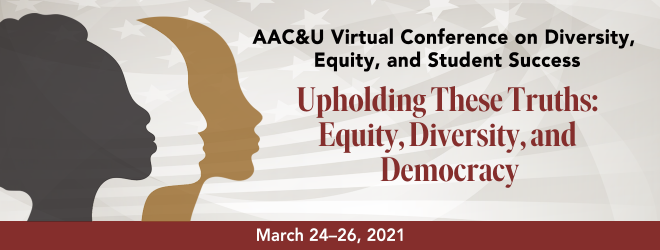
Association of California School Administrators (ACSA) BU Wednesday Webinar Series
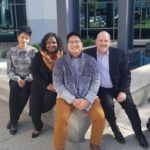 Thank you Association of California School Administrators (ACSA) and Dr. Barbara E. Bartels for extending the invitation to share “Connecting with our students, hearing their stories & cherishing their narratives” – applying the ECP framework and Cultural Competence Continuum as part of the ACSA/BU Wednesday Webinar Series.
Thank you Association of California School Administrators (ACSA) and Dr. Barbara E. Bartels for extending the invitation to share “Connecting with our students, hearing their stories & cherishing their narratives” – applying the ECP framework and Cultural Competence Continuum as part of the ACSA/BU Wednesday Webinar Series.
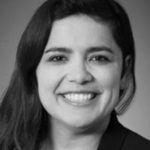 It was a pleasure to participate, share research & insight and to examine our lived experiences alongside my colleagues Dr. Nakisha Castillo, Dr. Dustin Domingo, Dr. Leticia Rojas & Dr. Donald B. Scott.
It was a pleasure to participate, share research & insight and to examine our lived experiences alongside my colleagues Dr. Nakisha Castillo, Dr. Dustin Domingo, Dr. Leticia Rojas & Dr. Donald B. Scott.
Impostor Syndrome; How Women Transform self-doubt to Claim Success (AAUW Webinar)
“Relieved and horrified at the same time…”
“There’s this constant self-criticism and fear of failure…”
“It doesn’t mean I’m a failure if I crash and burn…”
These were just some of the candid and thoughtful comments shared during the BU AAUW sponsored “Impostor Syndrome; How Women Transform self-doubt to Claim Success” webinar.
Led by Dr. Donald B. Scott and moderated by Dr. Lata Murti, the 35+ attendees engaged with featured speakers Dr. Ellen Belluomini and Dr. Kimberly Greene. Paired with a facilitated Q&A session led by Dr. Murti, Dr. Laura Galloway and Dr. Jalin B. Johnson, participants shared their experiences and asked questions of the panelists.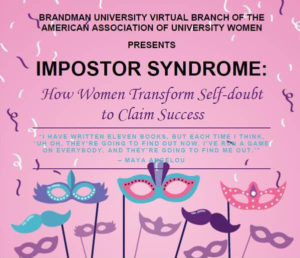
Drawing upon research conducted by Dr. Scott, based on the Impostor Syndrome construct developed by Dr. Pauline Clance and Dr. Suzanne Imes (1978), the group was able to achieve the following goals for the evening;
- Learn more about Impostor Syndrome and its effect on women
- Share success stories about women overcoming self-doubt and feelings of intellectual fraud
- Receive and provide suggestions for learning how to cope with Impostor characteristics
- Learn more about and exchange valuable resources
- Normalize the experiences and feelings of an Impostor
The Impostor Syndrome: A construct that describes highly successful individuals who experience feelings of fraudulence, a fear of being exposed, and the inability to internalize actual success.
Three primary characteristics include an individual’s feelings of fear of evaluation, fear of not being able to repeat his or her success, and fear of being less capable than others.
Raising Children of Color Amid Conversations About Police Involved Shootings, Implicit Bias & Self-Efficacy
By Dr. Jalin B. Johnson
National Center for Institutional Diversity – Spark series
As a mother raising a Black man in the United States, I frequently have discussions with our son about safety during police interactions, situational awareness, perceived behaviors, and implicit bias. While these conversations are meant to keep him aware of the reality he will face in life as a person of color, I strive to also encourage his self-efficacy, (confidence in the ability to have control over our own behaviors and social environment (Bandura, 1977), as he matures.
Like other parents to children of color, I know the emotional tax and ongoing concern from having conversations with our children that are intended to prepare them for a world that will judge them prematurely, and diminish the confidence they need to succeed as adults.
Critical Race Parenting says “parenting happens amidst contemporary societal contexts rife with unpunished police violence against Black and Brown youth, all occurring amidst contentions that we now live in a post-racial U.S. society” (Bonilla-Silva, 2006; Carter-Andrews & Truitt, 2013). The conversations we have with our son, about police involved shootings, implicit bias & self-efficacy, mirror what Critical Race Parenting outlines. Our discussions provide an example of how “communities of color have long recognized the need for instilling in our children a critical understanding of institutional racism, as well as the strategies and identities essential to collective and individual health, safety, and endurance” (DePouw & Matias, 2016).
When we talk with our son, we touch on the statistics of police-involved shootings. To date, the Washington Post has documented over 780 people shot and killed by police this year, with a majority (530), identified as Black, Hispanic, and otherwise non-white. The New York Civil Liberties Union (NYCLU) reported that “between 2014 and 2017, young Black and Latino males between 14 and 24 years-old account for only five percent of the city’s population, compared with 38 percent of reported stops. Young Black and Latino men were innocent 80 percent of the time.”
To add, the NYCLU found that the New York Police Department used force on over 21,000 Black and Latino people and over 2,200 white people. Subsequently, even among those stopped, Black and Latino people were more likely to have force used against them than white people (NYCLU, 2014). The American Civil Liberties Union Illinois 2015 Stop and Frisk report states: “[The stop and frisk] procedure is often invasive, humiliating and disturbing.” The deaths of Black and Latino men and women at the hands of police officers demonstrate that this and similar encounters with law enforcement, have proven to be more than “invasive, humiliating and disturbing,” they are too often, fatal.
Being aware of the statistics that document these realties also requires parents to pay attention to media reporting that covers police involved shootings. When Philando Castile and Walter Scott were killed by police during traffic stops, our discussion with our son about how to behave as a driver or passenger of a car in these situations intensified. Similarly, when Atatiana Jefferson and Botham Jean were murdered in their own homes by police officers in Texas, we revisited discussions about implicit bias, which describes how unconscious actions and decisions are influenced by stereotypes and attitudes.

I learned not long ago that our son is beginning to better understand this reality. He shared an experience he had at the home of family friends. During a conversation with the friend’s father, a law enforcement officer, like most of the other guests in attendance, he told our son he considered him to be a positive influence on his own son and their friends.
During this interaction, our son was mindful of fatal encounters between Black men and women and police officers in this country and our many conversations about being respectful towards his elders, while maintaining his behavior, in a way he thought was ‘right.’
Although emotionally taxing, as parents raising children of color, it is critical that we continue to have conversations with our children that prepare them for a world that will judge them prematurely. We must have these imperative discussions while still encouraging their confidence as they mature to become the people they wish to be.
Courageous Conversations: Creating a Safe Space for Dialogue on Race, Gender and Ethnicity
December 11, 2019
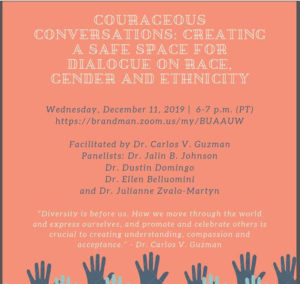
Moderated by Dr. Carlos V. Guzman, panelists Dr. Jalin B. Johnson, Dr. Dustin Domingo, Dr. Ellen Belloumini and Dr. Julianne Zvalo-Martyn participated in the BU virtual branch of AAUW hosted session “Courageous Conversations: Creating a Safe Space for Dialogue on Race, Gender and Ethnicity.”
Dr. Guzman led participants in gauging “one’s understanding of biases, values, beliefs and attitudes about cultural diversity.”
Additionally, participants were able to “gain skills in terms of strategies for encouraging courageous conversations around cultural diversity.” This included discussion on gender, microagressions, ethnicity and self-awareness.
Panelists addressed important questions (along with participant Q&A) in the following areas;
- How the current political/social environments impact the work done with our students.
- Issues observed when working with students relating to race, gender and ethnicity.
- Our role as educators, relating to these issues.
- Strategies used to create an environment for courageous conversations among students.
The session was facilitated by BU AAUW 2019-2021 branch President, Dr. Lata Murti.
Equity and Intersectionality: Considering Student Identities and Experiences
Being invited to kick-off the Faculty Series coordinated by the Academic Advising Professional Development Committee, was truly an honor. I was proud to be joined this week by my esteemed colleague, Dr. Lata Murti, as we presented “Equity and Intersectionality: Considering Student Identities and Experiences,” at the inaugural Faculty Series event.
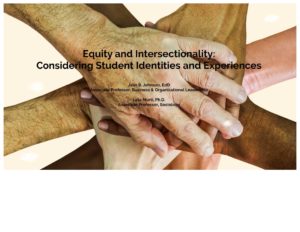
This follow up to the June 2019 Advising Summit (collaborative Keynote session) ‘Experience, Context and Perspective; Connecting with our students, hearing their stories & cherishing the narrative,’ was yet another effort by our pioneering Academic Advising team, to continue important discussions surrounding Diversity, Equity, Inclusion and Social Justice. Thank you all again for the gracious invitation and for all that you do for our community and to support our students & peers within the academy.
*A special thank you Courtney Crosta, Taylor Vartanian, Patricia Popovich, Dr. Donald B. Scott and Dr. Lata Murti for your scholarship and partnership.
Inland Ivy Foundation hosts Dr. Dorothy Buckhanan Wilson for ‘You Can Lead’ Book Tour event
The Inland Ivy Foundation hosts Dr. Dorothy Buckhanan Wilson, author of You Can Lead.
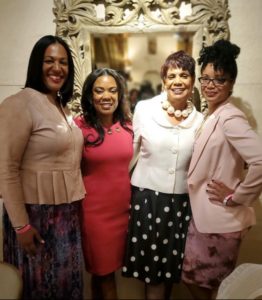 Wilson’s ‘You Can Lead‘ book signing event was held at the historic Mission Inn (Riverside, CA). Dr. Jalin was pleased to join noted scholars, community advocates & organizers, educators from k-12 and higher ed, in addition to local entrepreneurs and representatives from the private and non-profit arenas, also in attendance.
Wilson’s ‘You Can Lead‘ book signing event was held at the historic Mission Inn (Riverside, CA). Dr. Jalin was pleased to join noted scholars, community advocates & organizers, educators from k-12 and higher ed, in addition to local entrepreneurs and representatives from the private and non-profit arenas, also in attendance.
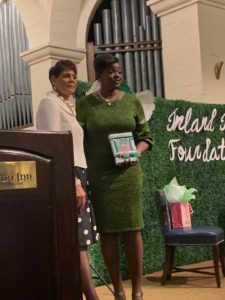 Dr. Wilson (pictured here with Mrs. Linda Gaines-Brooks), addressed her book, ‘You Can Lead,’ via her ‘compelling storytelling & practical tips to walk the reader through 30 valuable leadership lessons gained during her 30 plus years of corporate, non-profit and civic experience.’
Dr. Wilson (pictured here with Mrs. Linda Gaines-Brooks), addressed her book, ‘You Can Lead,’ via her ‘compelling storytelling & practical tips to walk the reader through 30 valuable leadership lessons gained during her 30 plus years of corporate, non-profit and civic experience.’
The event closed with an engaging Q&A session moderated by author, Stephanie Walton.
The event was co-sponsored by members of Alpha Kappa Alpha Sorority Inc., Southern CA Cluster Chapters, The San Bernardino Valley Chapter of The Links, Incorporated, Top Ladies of Distinction Incorporated,The Pressley (Moore) family, Streeter Realty, Gerri Foxall-Kater, Phyllis Chavis, Tillman Riverside Mortuary and other community sponsors.
What is organizational leadership? Breaking down the basics
What is organizational leadership? Breaking down the basics
June, 05, 2019
You have your sights set on climbing the ladder to play a more integral role in your company. But how do you proceed? It’s possible that an organizational leadership degree could be exactly what you need to hone your leadership skills, helping you learn how to be effective in implementing organizational change, promoting teamwork and empowering your team to achieve success.
What is organizational leadership, exactly? Dr. Jalin B. Johnson, associate professor of business and organizational leadership at Brandman University, offers clarification by explaining what relevant degree programs aim to do.
“Effective is the key word,” Dr. Johnson offers. In organizational leadership programs, she says, “we are offering students the opportunity to look at leadership holistically. They leave with something tangible that can make them a more effective leader.”
You may be wondering whether a degree in the field can help propel you to new levels in your career. Read on as we explore the ins and outs of organizational leadership, while outlining what to expect at both the bachelor’s and master’s levels.
What is organizational leadership, exactly?
Generally speaking, organizational leadership takes traditional leadership skills to the next level by incorporating key aspects of human psychology. The basic premise of organizational leadership is to employ a management strategy that simultaneously works toward what is best for individuals and what is best for the company as a whole. Dr. Gale Mazur, associate professor in the School of Business and Professional Studies at Brandman University, recalls a former student explaining this idea perfectly.
“She said she came into the program as a good manager, but she was leaving the program as a very effective leader,” Dr. Mazur recounts. The student was already a good supervisor who ensured tasks were completed, but she left the program understanding how to provide vision that helped employees feel more engaged.
Dr. Mazur explains that the ability to align people with the goals of the organization can be paramount in motivating and inspiring employees to bring that vision to fruition. In essence, impactful leaders must set the tone and direction of the company while working toward achieving organizational goals.
In their commonly cited paper, “The Nature of Organizational Leadership,” researchers Stephen J. Zaccaro and Richard J. Klimoski suggest the success of the collective whole is a major criterion for effective leadership. Every organization is comprised of individual parts that assist one another to work together as a system. The tenets of organizational leadership call upon leaders to learn how to capitalize on the strengths of individuals, manage around any weaknesses and use this focused management approach to accomplish what is best for everyone.
Zaccaro and Klimoski pose the idea that great organizational leaders impact the routine activities of their companies, and also know how to use their leadership skills in response to or in anticipation of non-routine events. This means effective leaders gain such an in-depth understanding of their organization and its employees that they can manage change within the system without disrupting it.
What are your organizational leadership program options?
If you’re looking to advance your business and leadership skills, you might be wondering what type of program you should be looking for. Dr. Mazur suggests considering what it is you’re looking to gain from a degree.
“If you’re looking for the basic skills to get a job in the business world, you’d probably be better suited for a bachelor’s in business administration,” she says. “But if you’ve found your niche and want to gain the additional skills you need to move ahead as a leader, you might consider an organizational leadership program.”
Dr. Mazur further explains that people are often hired for their technical skills, but later transition to management or leadership roles where the capacity to work well with people becomes more important. Organizational leadership programs help professionals hone those impactful people skills that can help them make the jump from individual contributor to effective leader.
What to expect from a bachelor’s in organizational leadership
Simply put, the undergraduate route would be right for you if you’re interested in organizational leadership but have not yet earned a bachelor’s degree. That’s true even if you have work experience.
“I find more often than not that undergraduate organizational leadership students are people who have been in their field or industry for some time,” Dr. Johnson says, “and they have come to the point where they need to enhance their qualifications to advance.” She explains that these professionals are often told by their company they’ll need to earn a bachelor’s degree to move ahead.
At Brandman University in particular, professionals from just about any field who are seeking a bachelor’s degree can benefit from the Bachelor of Arts in Organizational Leadership program.
“That’s part of the benefit of Brandman’s organizational leadership programs,” Dr. Johnson divulges. “We are not industry-specific. We have different backgrounds. Across the board, we’re looking at how organizational leadership tools can be applied no matter your industry.”
At the baccalaureate level, Brandman University offers professionals a comprehensive curriculum that includes marketing, human resources, economics, organizational behavior, ethics, team building, finance, accounting and leadership.
With emphasis options like supply chain systems and organizational administration, the vast course offerings include the following:
- Organizational Behavior
- Leadership and Professional Ethics
- Leadership in Diverse and Multicultural Organizations
- Research and Analytical Thinking
- Organizational Development and Change
- Theory and Practice of Leadership
Students who would prefer an online, self-paced program may find what they’re looking for in Brandman’s competency-based BBA in Management and Organizational Leadership program.
What to expect from a master’s in organizational leadership
When it comes to graduate-level programs, Dr. Mazur explains it’s common to see students who have several years of work experience and are now ready to take on additional leadership responsibilities. Some are even excited to take on executive roles.
“It’s not unusual to have students talk about being promoted midway through their program,” Dr. Mazur adds. “It’s because our program emphasizes putting what they’re learning into practice. It really does give them a competitive edge.”
Brandman University’s Master of Arts in Organizational Leadership program is great for professionals who want to explore leadership styles and strengthen their ability to focus on individual growth that leads to company success. It includes emphasis options ranging from business administration to human resources.
At the graduate level, you can expect some of the following course options:
- Organizational Research
- Democracy, Ethics and Leadership
- Self, Systems and Leadership
- Leading Organizational Change
- Organizational Dynamics
- Leadership and Team Development
The master’s program at Brandman University also enables military service members and veterans to apply their military experience toward their degree. In fact, those ranked E7 or above can earn their Master of Arts in Organizational Leadership in as few as seven classes.
Is an organizational leadership degree right for you?
As you analyze the possible ways you can move your career and your company forward, it’s clear you don’t need to wonder, “What is organizational leadership?” Perhaps you’re starting to see that a degree in this field can equip you with the skills you’ll need to achieve success. By learning how to meet challenges and accomplish goals — put forth both by individual employees and also by the organization as a whole — you can establish yourself as an impactful presence in just about any industry.
How Our Course Developer Certification Program Transformed Faculty, Their Perception of Diversity Cognizant Curriculum and Their Efforts in Course Development
An Investment in Innovation Is an Investment in People: How Our Course Developer Certification Program Transformed Faculty, Their Perception of Diversity Cognizant Curriculum and Their Efforts in Course Development
April 2019
Eight members of Brandman’s faculty presented at the Western Association of Schools and Colleges’ (WASC) conference. The WASC accreditation process aids institutions in developing and maintaining high standards of quality and effectiveness in student learning, and the conference is where Brandman showcases its leadership in best practices. The following faculty members presented:
- Laurie Dodge, Ph.D., vice chancellor of institutional assessment and planning – Backward Design: The Secret Sauce to Building Relevant and Quality Programs
- Marnie Elam. Ph.D., associate professor of psychology – A Simple Formula for Great Assignments and Rubric
- Melanie Borrego, Ph.D., associate dean of undergraduate education and professor of english and Leigh Ann Wilson, Ph.D., associate professor of history and communications – Five Ideas for Creating Community with Online Adjunct Instructors
- Helen Eckmann, Ed.D., associate professor of business administration and Laura Galloway, Ph.D., assistant professor of organizational leadership – Women, Money, and Self-Care
- Jalin Johnson, Ed.D., associate professor of business and organizational leadership and J. Murphy, Ed.D., associate vice chancellor of instructional innovation – An Investment in Innovation Is an Investment in People: How Our Course Developer Certification Program Transformed Faculty, Their Perception of Diversity Cognizant Curriculum and Their Efforts in Course Development
 Jalin B. Johnson, Ed.D., associate professor of business and organizational leadership and J. Murphy, Ed.D., vice chancellor of instructional innovation presented as part of the WASC “Designing Professional Development: Faculty and Courses” moderated session. The presentation focused on Brandman’s Course Developer Certification (BCDC) program and Diversity Cognizant Curriculum.
Jalin B. Johnson, Ed.D., associate professor of business and organizational leadership and J. Murphy, Ed.D., vice chancellor of instructional innovation presented as part of the WASC “Designing Professional Development: Faculty and Courses” moderated session. The presentation focused on Brandman’s Course Developer Certification (BCDC) program and Diversity Cognizant Curriculum.
From Academic Integrity to Creating Inclusive Classrooms; Faculty training continues important discussions
March 2019
Inland Empire and High Desert-based full-time and adjunct faculty came together for their annual Professional Development Day (PDD). This was the 11th PDD representing multiple campuses and an interdisciplinary team that included 35 attendees from full-time and adjunct faculty, campus directors and representatives from Riverside (Kristin Plapis, campus director), Menifee (Miguel Aranda, campus director), Victorville (Susanne Eisenhart, campus director) and Ontario (Patrick Pierson, campus director), and teacher supervisors.

The planning and facilitation team included Jalin Johnson, Ed.D., Nakisha Castillo, DMFT, Lynn Larsen, Ph.D., Leticia Rojas, Ed.D., and Nicole Schneider, Ed.D.

During this St. Patrick’s Day themed event, hosted by the BU Riverside campus, facilitators and speakers discussed an array of topics including:
- Systemwide updates and campus information via our area campus directors, Kristin Plapis and Miguel Aranda
- Technology tools and updates including Zoom and the new Brandman website, led by Nicole Schneider, Ed.D. and Lynn Larsen, Ph.D.
- An academic integrity session led by Brandman’s Governance and Appeals Committee members, Nakisha Castillo, DMFT and Lynn Larsen, Ph.D.
- An interactive workshop on creating more inclusive spaces in our classrooms led by Nakisha Castillo, DMFT and Leticia Rojas, Ed.D.

Doctoral program students and guests expand their perceptions of diversity
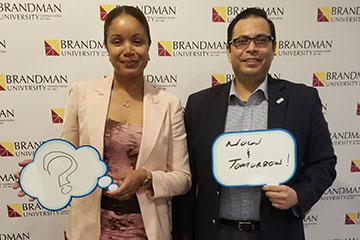
Brandman School of Business and Professional Studies faculty members Jalin Johnson and David Gonzalez.
The winter immersion session for Brandman University’s Doctor of Education in Organizational Leadership first- and second-year students doesn’t just bring students from throughout the U.S. and faculty members together to learn from each other. It also provides an opportunity to introduce potential students to the program by inviting them to a keynote address.
This year’s keynote featured Brandman faculty members Jalin Johnson, Ed.D., and David Gonzalez, DPS, who spoke about “diversity cognizance” or the way that transformational leaders can make room for diverse backgrounds and perspectives at the decision-making table.
The talk focused on how the concept is “relevant across an array of fields, professional and personal settings,” reported Johnson, who used her experience-content-perspective (ECP) model to spark discussions about “how our lived experiences shape the context with which we view any given situation, and, in turn, influence the perspectives that we bring.”
Using facilitated sessions, some with the whole group and others broken into small groups, Johnson and Gonzalez walked participants through a key questions assessment and then gave attendees the opportunity to face their perceptions and assumption and share what they discussed with the larger group.
Johnson said the challenge is to consider the many different experiences and perspectives in the room while being mindful of diverse opinions and allowing those to each be valued.
Discussions about diversity encompassed socio-economic status, military status, disability and accessibility, ageism, equality, gender, implicit bias, sexuality and equity-centered themes.
Gonzalez and Johnson were told by one participant that they took “a difficult topic, adding a bit of humor and spice and creating a safe place for all to learn, grow and communicate.”
Students and visitors in a post-session survey praised both the choice of topics and the activities included. “I would have loved to spend the entire day on this topic. It is so needed in our communities and country right now!” wrote one.

Self-paced learning: Brandman MyPath™ launches new program for innovative leaders
January 04, 2019 by Brandman Career Services
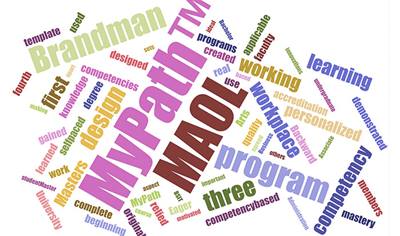 The bell has rung on a new year – a time for reassessing the way things have always been done and trying something new.
The bell has rung on a new year – a time for reassessing the way things have always been done and trying something new.
At Brandman University, nobody waits for the turn of the calendar year to try a new approach. Take, for instance, how the university teaches organizational leadership, an academic topic that has been around for nearly a century.
Now Brandman University is adding a new twist with its competency-based approach to the Master of Arts in Organizational Leadership (MAOL). The program is awaiting final approval, but the university is taking inquiries about enrollment.
The Brandman MyPath™ approach mirrors what faculty member and course creator Laura Galloway, Ph.D., calls some of the most important aspects of leadership, “self-reflection, self-inspection and self-control,” both in content and in what’s required of the students trying a new way of earning a degree.
Brandman MyPath™, an approach to competency-based learning, doesn’t just provide theories and examples of how leadership shapes organizations, it asks students to put those theories to use, demonstrate mastery and analyze the results for a students’ workplace or other organization.
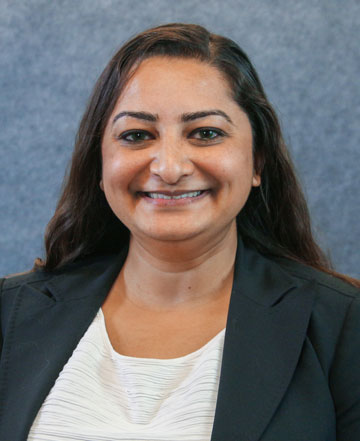
Assistant Dean of the School of Business and Professional Studies Monica Shukla-Belmontes
We talked with Brandman University faculty members and course creators Monica Shukla-Belmontes, Ph.D., Jalin Johnson, Ed.D., and Galloway about what sets the competency-based education apart from Brandman’s blended and online courses, who might best fit this course design and what it takes to be a leader.
The MAOL program is the fourth competency-based program designed by Brandman University and the first to use a template created with knowledge gained from the first three programs (Bachelor of Business Administration, B.S.I.T., and designed but still pending approvals Associate of Arts). Eager to complete the work to qualify for accreditation, all three faculty members said they relied on what they had learned while working on the original undergraduate Brandman MyPath™. Backward design – working from how mastery of the competency could be demonstrated to the beginning – was used in each program.
“It’s a neat process. We work closely with (course) designers,” said Shukla-Belmontes. “We strongly focused on the takeaways for the students and how do we achieve those goals.”
Personalized learning
While innovations in course design are important, all three agreed that it’s the self-paced aspect of competency-based learning that sets this master’s program apart from any others, making it ideal for the motivated student.
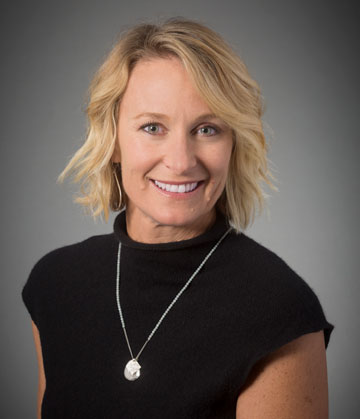
Assistant Professor Laura Galloway
“A student who has had a lot of experience in the workplace can really through these competencies quickly,” said Galloway. “If they want to get through as many as they can in a year, have at it. That’s the great part about it.”
Unlike a traditional program that would have a start and end date for each course, the competency-based program is divided into areas to master, each with assessments along the way. Assessments come in the forms of everything from quizzes to papers to presentations.
“Content-wise, I think it is more robust than the traditional ones are,” said Galloway. “There is no way for students to progress without reading, using and referencing all of the content.”
“There’s a heightened sense of individual self-efficacy,” said Johnson. “Students can see that they understand the competency in their own environment. It’s really good for building a person’s confidence as well as competence.”
All-in-one learning
Content is cross-referenced to traditional MAOL courses, said Shukla-Belmontes, but in the Brandman MyPath™ approach, textbooks are replaced by content embedded into the course.
Each competency builds or scaffolds into the next one so that students are applying both their workplace knowledge and their newly gained academic knowledge as they progress.
Although Brandman MyPath™ is designed without in-person classroom interaction, it still requires and offers ways to interact with other people, a key component of leadership.
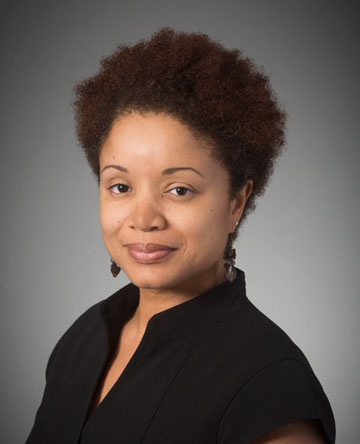
Assistant Professor Jalin Johnson
“Once a month we hold a community meeting,” said Shukla-Belmontes. Those virtual meetings are open to everyone in the course and could address general topics, such as writing skills, or specific ones, such as strategies for being an effective leader. The tutorial faculty works one-on-one, providing feedback as a student works toward mastery. How often a student takes advantage of that is up to the student, another aspect of personalized learning.
For students who aren’t currently working, there are options to reflect on previous employment or volunteer activities. In one competency, a student has to demonstrate how he or she would lead a team through a team-building activity. “We ask people to videotape it, as much as possible, so it’s still hands-on even though it is individually based,” said Galloway.
Any graduate program, whether online, blended or competency-based, should be rigorous and encourage higher-level thinking, said Shukla-Belmontes. “Students like to be challenged.”
What’s great from beginning to end is you are clear and confident about what the student is going to learn,” said Galloway. “If you don’t pass (a competency), you’re redirected to learn it. You can’t say that about regular courses.”
Meet the faculty members
Shukla-Belmontes is the associate dean for corporate pathways and competency-based education in the School of Business and an assistant professor. She created two competencies, one addressing business functions and the other conflict and negotiations.
Johnson is an assistant professor of organizational leadership and created the capstone competency, the final assessment.
Galloway is also an assistant professor of organizational leadership and developed two competencies.
Experience, Context and Perspective; Connecting with our students, hearing their stories & cherishing the narrative

AAUW Brandman members start diversity and academia conversation
May 31, 2018 by Brandman University
Brandman University’s virtual branch of the AAUW left the online world in May to hold an in-person forum on diversity. More than 70 people attended the forum in Irvine, including faculty members, administrative leaders and staff members.
The Forum on Diversity and Inclusiveness offered a safe space for people of diverse backgrounds to talk about issues surrounding diversity and inclusion and overcoming social and academic barriers. The AAUW’s goal was to generate a pathway for resolving challenges associated with diversity in higher education and academia, said the organizers.
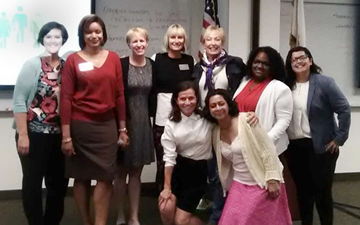
From left, standing: Tami Lincoln, Jalin Johnson, Lynn Larsen, Laura Galloway, Helen Eckmann, Nakisha Castillo, Leticia Rojas. Front: Kimberly Greene, Lata Murti. Not pictured: Randa Jad-Moussa.
The committee organizing the event included AAUW branch members from across disciplines:
- AAUW branch President –Tami Lincoln, Ed.D.
- AAUW branch Diversity Chair –Jalin B. Johnson, Ed.D.
- Lynn Larsen, Ph.D.
- Laura Galloway, Ph.D.
- Helen Eckmann, Ed.D.
- AAUW branch Financial Secretary –Nakisha Castillo, DFT
- Leticia Rojas, Ed.D.
- Kimberly Greene, Ed.D.
- Lata Murti, Ph.D.
- Randa Jad-Moussa
‘Our university has always prided itself on its diverse student body. Our students come from diverse backgrounds and experiences, and our faculty and staff honor that diversity by coming together to share ideas about diversity and inclusion,” said Lincoln. “The forum was an opportunity to build community within our institution, and in the end, that community better serves our students.”
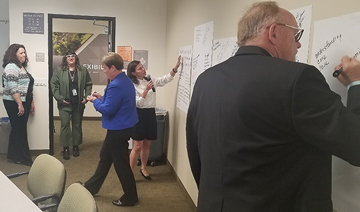
Faculty members wait their turn to add comments on diversity and inclusion experiences.
“The questions, prompts and discussion format provided participants the opportunity to critically look at issues in our household, community and the world we share,” said Assistant Professor Hawani Negussie. “I found reflections expressed by individuals to be moving … the space we exist in at any time benefits from the representation of diverse thoughts to mitigate implicit and explicit biases.”
Others called the event powerful, timely, surprisingly relaxed and a chance to recognize how their backgrounds inform their decisions.
Those attending engaged in three discussions: defining diversity from a personal perspective, real-world examples of inclusiveness and its impact on a situation, and planning toward solutions and efforts that drive curriculum.
“During my ten years as a member of the Brandman University community, I have yet to see such an inspiring collection of shared wisdom, cross-disciplinary cohesion, selfless discussion, awareness building and purposeful listening, among our peers (while outside of the classroom environment), as I did during our first Forum on Diversity and Inclusiveness,” said Johnson, who facilitated the event.
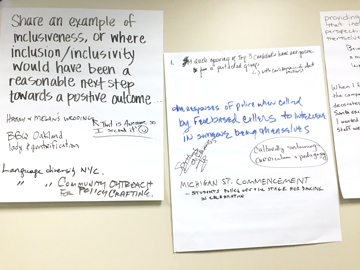 “It is very easy (and often comfortable) to remain in a silo without challenging our biases and comfort levels. Today, we began a discussion and took a powerful step towards challenging assumptions. I look forward to our continued goal setting and action towards positive and inclusive next steps.”
“It is very easy (and often comfortable) to remain in a silo without challenging our biases and comfort levels. Today, we began a discussion and took a powerful step towards challenging assumptions. I look forward to our continued goal setting and action towards positive and inclusive next steps.”
The voluntary event was held just before the start of the spring faculty retreat to give those who work at remote campuses a chance to attend in person.
“This was a was powerful experience! I saw humanity and felt the compassion in the voices of my colleagues. By the end of the session, there was a shift in the room, that moved towards the opportunity for change to occur,” said Castillo.
WASC conference presenters share Brandman’s path to an Ed.D. dissertation, faculty development
Brandman’s innovative approaches to its Doctor of Education in Organizational Leadership and to improving professional development for adjunct faculty members were the focus of presentations at the 2018 WASC Senior College and University Commission’s Academic Resource Conference.
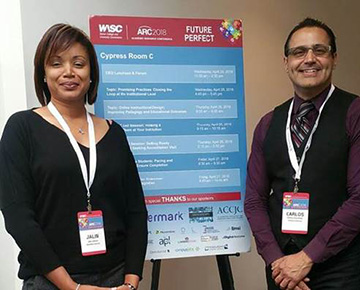 With the theme “Future Perfect,” the conference centered on the nature and quality of teaching and learning at the university level and showing how that leads to greater student achievement.
With the theme “Future Perfect,” the conference centered on the nature and quality of teaching and learning at the university level and showing how that leads to greater student achievement.
Faculty members Jalin B. Johnson, Ed.D., from the School of Business and Professional Studies and Carlos Guzman, Ph.D., from the School of Education shared the data they collected over a four-year span that focused on the confidence doctoral students had in their abilities to complete various tasks before and after taking the prospectus writing course.
WASC conference presenters and Brandman faculty members Jalin Johnson, Ed.D., and Carlos Guzman, Ph.D.
“Increasing the potential for doctoral students to successfully complete their dissertations; a curriculum driven self-efficacy study” found significant increases in confidence for such things the ability to generate a purpose statement, align research questions, establish significance and synthesize the literature.
A second presentation focused on efforts to help adjunct faculty members from four campuses in two counties develop their teaching and technology skills and help students succeed. Johnson, Leticia Rojas, Ed.D., and Nicole Schneider, Ed.D., both from the School of Education presented “Faculty Professional Development; a multi-discipline, interactive faculty training initiative geared towards enriching and enhancing the instructor pedagogy experience.” Lynn Larsen, Ph.D., from the School of Education and Nakisha Castillo, DMFT, from the School of Arts and  Sciences also contributed to the report.
Sciences also contributed to the report.
Jalin Johnson, Nicole Schneider and Leticia Rojas
Among their findings:
- Need for connections to others in the adjunct community is evident.
- Contact with the campus team is invaluable.
- Small working groups produce significant results.
- Professional Development Days have a positive impact on campus culture.
- Better informed adjuncts equal better student experiences.
- Recognition is well received.
They also touched upon how they facilitate the content covered and how they offer career education units, guest speakers, community-based service and student-centered initiatives.
Interdisciplinary team earns Brandman group a ‘Happy Customer’ nod from Esri
March 16, 2018 by Cindy O’Dell
 A team from Brandman, including faculty, staff and a student, represented the university at Esri’s Education Open House earlier in March.
A team from Brandman, including faculty, staff and a student, represented the university at Esri’s Education Open House earlier in March.
Lindsay Yossef, Katy Curameng, Melissa Meyer, Jalin Johnson, Jennifer Woodward and Sheila Steinberg at the Esri Higher Education Open House.
Brandman’s innovative collaboration with Esri for curriculum design and delivery put the university in the “Happy Customer” category along with nine other organizations, agencies and international groups.
Attending from Brandman were Katy Curameng, director of Career Services; Sheila L. Steinberg, Ph.D., professor of social and environmental sciences at Brandman; Lindsay Yossef, Ed.D., instructional designer for the Center for Instructional Innovation; Jalin Johnson, Ed.D., assistant professor in the School of Business & Professional Studies; Melissa Meyer, J.D., assistant professor in the School of Arts and Sciences; and Jennifer Woodward, an undergraduate student majoring in integrated social science and whose coursework used Esri geographic information systems mapping and analytics software.
“As a novice to GIS, it was exciting to see the live demonstrations. We learned about its applications and job prospects for the future. Esri was very welcoming to the Brandman team,” said Meyer.
“It was impressive to watch how Esri uses GIS in action and learn more about the skills and opportunities this technology can provide to our students in reaching their career goals. Hearing about the work ESRI is doing to bring in and support new professionals in this field through various programs was extremely inspiring,” said Curameng.
In addition to presentations about ArcGis Learn, Living Atlas and the “Science of Where,” the Brandman team learned about potential career and internship options for students at Esri.
The university and Esri are partnering on creating programs for undergraduate and graduate students, as well as a certificate program for nonprofits. For additional information about the nonprofit certificate program, sign up for a webinar here.
Inland Empire adjuncts build teaching skills with help from full-time faculty
March 12, 2018
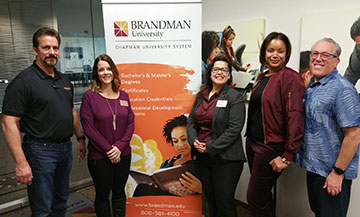
Patrick Pierson, Ontario campus director, and faculty members Nicole Schneider, School of Education; Leticia Rojas, School of Education; Jalin Johnson, School of Business and Professional Studies and Jonathan Greenberg, School of Education, were among those leading breakout sessions for adjunct faculty members.
Learning about best practices isn’t just for Brandman students. Twice a year, adjunct faculty members from the Ontario, Victorville, Riverside and Menifee campuses gather to improve their teaching skills with help from full-time faculty members.
The most recent session focused on best practices such as the best ways for
- Supporting students
- Developing synchronous and asynchronous classroom techniques
- Becoming ADA compliant in the classroom
- Making full use of Blackboard technology and embedding interactive web-based tools
- Using Live Text technology and support.
More than 45 adjunct faculty and clinical coordinators attended the sessions at the Ontario campus.
They also reviewed academic integrity and APA formatting. Speakers and breakout session facilitators were
- Patrick Pierson, Ontario campus director
- Jalin B. Johnson, Ed.D., School of Business and Professional Studies faculty
- Leticia Rojas, Ed.D., School of Education faculty
- Nicole Schneider, Ed.D., School of Education faculty
- Barbara Bartels, Ed.D., assistant vice chancellor of Community Relations and Strategic Business Development
- Jonathan Greenberg, Ed.D., School of Education, adjunct and Ed.D. cohort mentor
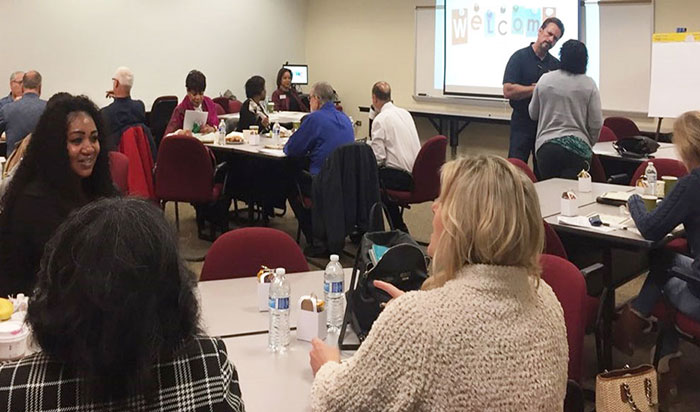
Johnson said feedback included appreciation for getting a chance to share problems and solutions with peers and the introduction of new teaching strategies.
“This is my sixth year facilitating and being a part of the planning team for this bi-annual event. Our adjunct faculty and clinical coordinators do so much for our students. We are pleased to give them something additional in return,” said Johnson.
How to sound supervillain savvy at this year’s Comic-Con
July 19, 2017 by Jalin B. Johnson, Ed.D.
 You wouldn’t have a story without the good vs evil, but beyond the entertainment factor, have you dug deep into the bad guys’ backstories and explored what makes them tick?
You wouldn’t have a story without the good vs evil, but beyond the entertainment factor, have you dug deep into the bad guys’ backstories and explored what makes them tick?
While it may seem unconventional, we can learn a good deal about ourselves by looking at the ethical reasoning behind decisions made by some of pop-cultures reigning supervillains.
Yes, villains have ethics!
There is a psychological and a philosophical reason behind every decision a supervillain makes. The psychological part suggests how we create ethical judgments and the philosophical part shows how we justify these ethical judgments. Here’s a breakdown of a few of our top modern-day supervillains:
Vulture
In the 2017 Jon Watts Marvel Studios, Columbia Pictures and Pascal Pictures addition to the Spider-Man franchise, we are introduced to Vulture (alias Adrian Toomes). As in the Marvel comic character’s canon, Toomes battles his own demons; wavering at times between villainous ways and the righteous path.
In the cinematic version, he is an ‘everyday,’ hardworking guy who feels unfairly treated and cast-aside by the government. When presented with the opportunity to get ahead on his own terms, Toomes leads a team of other outcasts to reclaim leftover alien weaponry and parts in an effort to sell them on the underground market. His philosophical belief that he was wronged, leads him to break the rules set by the very government he protests, thus leading him into a life of crime.
Ares
In the 2017 Patty Jenkins DC Entertainment & Warner Bros. produced Wonder Women film, we see the how the perils of war influence the ethical reasoning behind our heroes featured nemesis. Although in New 52 DC canon, Wonder Woman (Diana) is the daughter of Zeus and Hippolyta (of Themyscira), in this cinematic box office hit, Diana is the daughter or Ares.
Focused on the mid to late 1930’s rise of Adolf Hitler and the Nazi regime, Ares (alias’ Sir. Patrick and God of War), hones in on the trouble with humanity – its taste for violence and destruction. On a campaign to prove his theory that this evil tendency resides in all of mankind, Ares, while living as Sir Patrick, rises in the ranks of the British government, increasing his psychological influence on others along the way. His ethical reasoning yields to decisions to both empower humans with weapons of mass destruction while watching them self-destruct to prove his point.
Ego
Likewise, within the 2017 James Gunn directed sequel of the big screen Guardians of the Galaxy series (Marvel Studios), there are some changes to canon to help show the conflict between right and wrong.
In the Dan Abnett and Andy Lanning created comics, our main character, Star Lord, is the son of J’son of Spartax. In the Guardians Vol. 2 adaptation, Star Lord (alias Peter Jason Quill), is the son of Ego.
A supervillain, set to maintain his legacy in the cosmos, Ego has made it his life’s work to create an offspring worthy of his gifts. He has decided that traveling the planets to find a partner with which to create a new life is a sound decision if only to meet his ultimate goal. His philosophical premise is that it is for the greater good, while showing little concern for those he leaves behind while on his quest.
In each of these snapshots, we see how ethical reasoning overshadows care and concern for others in the lives of some of pop-cultures reigning supervillains. Share with us how you relate to these – and other – comic supervillains. What are your ethics, and how do you justify them?
Reina, Ramen, Luna & Waliochaguliwa (Wali) in the news…
Council of College and Military Educators conference
Council of College and Military Educators (CCME) conference – “Collaboration: Strengthen Ourselves for Those We Serve”
March 2017

Nirmala Sharma, Glenn Worthington and Jalin B. Johnson recently participated in the Council of College and Military Educators Symposium in Atlanta, Georgia. The conference theme was “Collaboration: Strengthen Ourselves for Those We Serve.” Sharma is the assistant vice chancellor for Military Services, Worthing is the dean of the School of Business and Professional Studies and a military veteran, and Johnson is an associate professor in the business school. Session topics included making the transition from military service to related careers, leveraging technology, raising awareness of campus programs and support for online students.
Virtual Learning – Best practices targeted during Inland Impire Professional Development Day
May 17, 2016
By Brandman University
More than 40 people from throughout Southern California participated in the May 14 Professional Development Day at Brandman University’s Ontario campus.
Academic advisors and campus directors from Ontario, Riverside, Menifee, Victorville, Irvine and the online campus joined adjunct faculty, full-time faculty and campus clinical coordinators from those campuses to learn more about teaching tools such as Blackboard and Adobe Connect, as well as teaching strategies and campus updates.
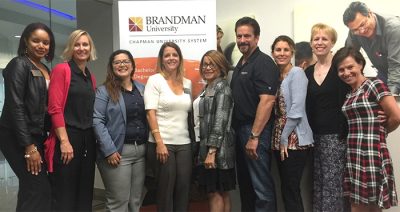
Event presenters: Dr. Jalin B. Johnson, Dr. Laura Galloway, Dr. Leticia Rojas , Dr. Nicole Schneider, Dr. Annie Hough-Everage, Campus Director Patrick Pierson, Campus Director Kristin Plapis, Associate Dean Lynn Larsen, Dr. Kimberly Greene
The event also gave the group a chance to honor retiring faculty members Dr. Annie Hough-Everage and Dr. Raymond Hurst, both from the School of Education.
“We are fortunate to have a diverse Professional Development Day (PDD) planning team. Our goal is to offer a rich array of content twice a year to our adjunct faculty, campus clinical coordinators and academic advisors in attendance as a part of our shared learning environment,” said Dr. Jalin B. Johnson, assistant professor in the School of Business and Professional Studies and event facilitator.
Engaging and Motivating Diverse Students Across Multiple Learning Platforms –
Monica Shukla, Jalin B. Johnson and Sheila Lakshmi Steinberg presented an interdisciplinary session, “Engaging and Motivating Diverse Students Across Multiple Learning Platforms,” at the recent Lily Conference on Teaching and Learning held in Anaheim, California.

Shukla is an associate dean in the School of Business and Professional Studies, Johnson is an assistant professor of business and organizational leadership in the business school and Steinberg is a professor of social and environmental science in the School of Arts and Sciences.
The presentation discussed the role that institutional demographics and diversity play in enhancing the learning environment. It also focused on presenting strategies to motivate adult learners to overcome challenges when returning to the educational environment after a break in education or when going from active military duty to civilian life.
It demonstrated tactics to engage students across multiple learning platforms, blended, online and competency-based. All three presenters have taught across the trifecta of Brandman’s multiple learning platforms and degree, enabling them to accurately share their real-world experience across a variety of classroom and individualized learning environments.
Brandman faculty, administrators attend national conference on education and equality
January 26, 2016 by Cindy O’Dell
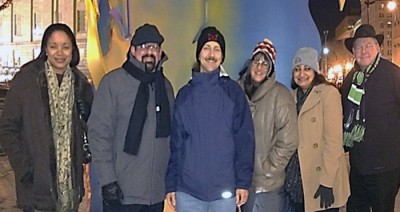
Jalin B. Johnson, Ned Camuso, Jeremy Korr, Sheila Lakshmi Steinberg, Monica Shukla and Michael McGuire.
Faculty members and administrators from the School of Business and Professional Studies and the School of Arts and Sciences braved the winter weather in Washington, D.C., over the weekend to participate in the annual meeting of the Association of American Colleges and Universities (AACU). The conference theme was “Land of Opportunity – But for Whom? How Higher Education Can Lead on Equity, Inclusive Excellence and Democratic Renewal.”
Dr. Jeremy Korr, dean of the School of Arts and Sciences, led a discussion seminar on “What is College,” focusing on identifying the characteristics of high-quality undergraduate college experience regardless of technological modality. Seminar participants included Dr. Monica Shukla, associate dean of the School of Business and Professional Studies; Dr. Ned Camuso, associate dean of Arts and Sciences; and Dr. Michael McGuire, associate dean of Arts and Sciences In a team presentation, Dr. Sheila Lakshmi Steinberg, professor of social and environmental sciences; Dr. Jalin B. Johnson, assistant professor of business and organizational leadership; and Shukla led a 75-minute interactive session, “Societal Needs, Student Questions and General Education: Making Connections through Online Competency-based Education,” discussing, among other topics, the progress Brandman University has made in the area of competency-based education with the MyPath program.
The conference was held Jan. 20-23.
Ethics 101 – Cindy O’Dell’s interview with Dr. Jalin
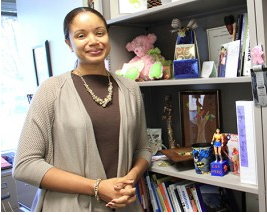
Americans with Disabilities Act (ADA) compliance – focus of biannual Professional Development Day
November 17, 2015
By Brandman University

Professional Development Day at Ontario campus.
The Ontario campus of Brandman University hosted a Professional Development Day and adjunct faculty meeting on Nov. 14.
The keynote speaker for the day was Dr. Loren O’Connor who talked about Americans with Disabilities Act (ADA) compliance and the services offered by the department he leads, the Office of Accessible Education and Counseling Services.
The day also included updates from each of the colleges presented by full-time faculty members, as well as system-wide and campus updates presented by Patrick Pierson, campus director in Ontario.
“All in all it was an energy-filled day of recognition, shared best practices and networking for the full-time faculty, adjuncts, academic advisors, senior administration from Irvine, School of Education teacher supervisors and Outreach team members from Ontario, Riverside, Menifee, San Diego, Irvine and Online campuses,” said Dr. Jalin Johnson, who helped coordinate the event.
Additional resources were sent virtually to those unable to attend.
